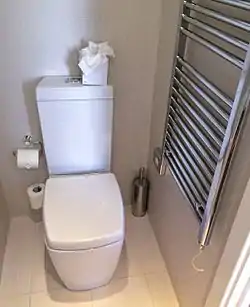tualett
Estonian

A toilet.
Etymology
Borrowed from German Toilette (“toilet”), from French toilette (“toilet; lavatory”), from both toile (“fabric; cloth”), from Old French toile (“fabric; web”), from earlier form teile, from Latin tēla (“web”), from Proto-Italic *tekslā, and the ending from -ette, feminine form of -et, from Middle French -et, from Old French -et, from Late Latin -ittus, from Proto-Italic *-tos, from Proto-Indo-European *-tós (suffix creating verbal adjectives).
Noun
tualett (genitive tualeti, partitive tualetti)
- a toilet (a room or enclosed area containing a toilet: a bathroom or water closet.)
- palun öelge, kus siin tualett on
- please tell me where the toilet is
- (formal) a toilet (a woman's style of dressing: dress, outfit.) (Can we add an example for this sense?)
- toilet (personal grooming; the process of washing, dressing and arranging the hair.)
- hambapesule järgnes hommikune tualett
- tooth brushing was followed by the morning toilet
Declension
Declension of tualett (type riik)
| singular | plural | |
|---|---|---|
| nominative | tualett | tualetid |
| genitive | tualeti | tualettide |
| partitive | tualetti | tualette / tualettisid |
| illative | tualetti / tualetisse | tualettidesse / tualetesse |
| inessive | tualetis | tualettides / tualetes |
| elative | tualetist | tualettidest / tualetest |
| allative | tualetile | tualettidele / tualetele |
| adessive | tualetil | tualettidel / tualetel |
| ablative | tualetilt | tualettidelt / tualetelt |
| translative | tualetiks | tualettideks / tualeteks |
| terminative | tualetini | tualettideni |
| essive | tualetina | tualettidena |
| abessive | tualetita | tualettideta |
| comitative | tualetiga | tualettidega |
Synonyms
Derived terms
- tualettpaber (“toilet paper”), tualettpott (“toilet bowl”)
See also
- latriin (“outdoor toilet”)
References
- tualett in Eesti keele põhisõnavara sõnastik
- tualett in Sõnaveeb
- tualett in Eesti keele seletav sõnaraamat
- tualett in Raadik, M., editor (2018), Eesti õigekeelsussõnaraamat ÕS 2018, Tallinn: Eesti Keele Sihtasutus, →ISBN
This article is issued from Wiktionary. The text is licensed under Creative Commons - Attribution - Sharealike. Additional terms may apply for the media files.